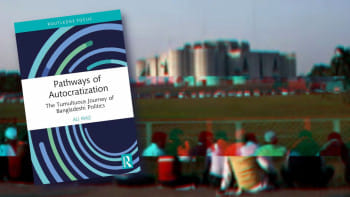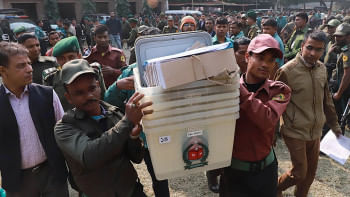What democracy indices say about Bangladesh

Bangladesh's ranking in the Democracy Index of the Economist Intelligence Unit (EIU) has gone down two notches: to 75 in 2023 from 73 in 2022, among 167 countries. This should not come as a surprise. According to the annual report published earlier this week, the EIU has continued to list the country among "hybrid regimes" since 2008. But does it tell the whole story? How should we read the ranking? Observers of Bangladesh's politics and governance have been underscoring the country's downward spiral away from the fundamental elements of democracy for almost a decade. Media coverage, particularly in the latter half of 2023, repeatedly mentioned that the country's governance has increasingly become autocratic.
Four international organisations are the most prominent that track the global state of democracy. They are Washington-based Freedom House, London-based Economist intelligence Unit, Gothenburg-based Varieties of Democracy Institute (V-Dem), and Stockholm-based International Institute for Democracy and Electoral Assistance (International IDEA). While the first three are private organisations, either attached to a university or operating independently, the fourth one is an intergovernmental organisation which has a goal of "advancing democracy worldwide, as a universal human aspiration and an enabler of sustainable development, through support to the building, strengthening and safeguarding of democratic political institutions and processes at all levels." The fifth organisation that also examines the state of democracy is the Gütersloh, Germany-based Bertelsmann Foundation. The transformation index of the foundation is published every two years.
Among the researchers of democratisation and democratic backsliding, the rankings and incisive exploration of various aspects of each country's democratic quality offered by these five organisations are considered as standard. The reports and data of these organisations not only shape academic discourses, but also influence policymakers to some extent.
As such, these rankings and assessments draw attention and engender discussion. Media reports in Bangladesh published after EIU annual rankings were quite natural. The ranking is based on scores of five elements of democracy: electoral process and pluralism, functioning of government, political participation, political culture, and civil liberties. It should be noted that the report analysed the data before the 2024 general election, while mentioning what was in the making in the name of the election. It stated, "Unsurprisingly, elections in Bangladesh, Pakistan and Russia—where opposition forces are subject to state repression—will not bring regime change or more democracy."
For understandable reasons, reporters and analysts have highlighted the comparison between 2022 and 2023 scores and noted that the country's standing has rather degraded. One must not only look at the country's standing vis-a-vis others, but also at the components where the country's scores have declined. As for the overall score, a three-year comparison shows that its score was 5.99 in 2021 and 2022, which has come down to 5.87 in 2023. The major decline has been in the civil liberties score: after remaining static at 5.29 for two years, in 2023 it has decreased to 4.71. Based on these scores, the EIU has continued to categorise Bangladesh as a "hybrid regime"—a system that provides a facade of democracy but is essentially authoritarian.
While the EIU's assessment of the country's quality of democracy is important, it should not be seen in isolation from how the country has featured in other institutions' evaluations. Freedom House's 2024 report is yet to be published, but the 2023 report, which examined the state of civil and political rights among other elements, categorised Bangladesh as one of "partly free" countries. Notables are the political rights and civil liberties scores: 15 out of 40, and 25 out of 60, respectively. Bangladesh's total score was a meagre 40 out of 100. Further disaggregation painted a grim picture. For example, the score on the question "Was the current head of government or other chief national authority elected through free and fair elections?" was one of four. In a similar vein, the country scored one out of four on the question "Is there a realistic opportunity for the opposition to increase its support or gain power through elections?" In some measures, it was not only about the past two elections, but it was also predictive of the 2024 election.
As for the overall score, a three-year comparison shows that its score was 5.99 in 2021 and 2022, which has come down to 5.87 in 2023. The major decline has been in the civil liberties score: after remaining static at 5.29 for two years, in 2023 it has decreased to 4.71. Based on these scores, the EIU has continued to categorise Bangladesh as a "hybrid regime"—a system that provides a facade of democracy but is essentially authoritarian.
If the EIU's assessment of the overall state of democracy and dwindling civil liberties is consistent with Freedom House's assessment and reflects the ground reality, one may also raise some concerns whether it provides a complete picture pointing to the assessment of other organisations. BTI's 2022 report described Bangladesh as a "moderate autocracy" with a score of 4.25. We may wait to see what score the Transformation Index assigns in its forthcoming report. The International IDEA's Global State of Democracy 2022 report, published in November 2022, described the country as an "autocracy." In 2023, the International IDEA moved away from classifying regimes on an overall basis, but measured and ranked country performance in four categories of democratic performance: representation, rights, rule of law, and participation. In these categories, Bangladesh's rank among 174 countries were 125, 134, 135, and 115, respectively. It needs no further elaboration as to where the country stands regarding the overall situation.
Referring to these scores, the Bangladesh Case Study by Emma Kenny, published by International IDEA, pointed to one aspect which warrants our close attention—that is, judicial independence. Kenny writes, "One particular area of concern is Judicial Independence, steadily weaponized by both dominant parties to consolidate power. Indeed, Bangladesh's measures of Judicial Independence have suffered serious declines in the last five years, placing it among the lowest performing in South Asia. These declines have been coupled with decreases in Representation (and particularly Elected Government) measures over the past decade. Part of these declines can be traced back to the 2014 and 2018 elections, which resulted in a weakened parliament lacking effective opposition, and centralized power in the hands of AL in what some critics argue resembles a one-party state."
The International IDEA's concern about the judiciary is also reflected in the scores on overall rule of law provided by the World Justice Project (WJP). According to WJP, Bangladesh scored 0.38 in 2023. The score has been on a downward trend since 2015, when it scored 0.42. The score was 0.39 in 2022, 0.40 in 2021, 0.41 in 2020. Kenny further notes, "Indeed, court proceedings at all levels have increasingly become weaponized to serve political ends." One can immediately recall the pace of delivering verdicts against BNP leaders and activists ahead of the sham election held on January 7 this year. Similarly, in the past months, global leaders have expressed concerns about the treatment meted to Nobel Laureate Prof Muhammad Yunus. They have called upon the country to stop "continuous judicial harassments."
One need not be reminded that a judiciary under the control of the executive branch is a hallmark of autocracy. In countries where democracy eroded and autocrats rose, be it Bolivia or Cambodia or Turkey, the judiciary has been used against political opponents, journalists and members of civil society. In the oft-quoted book titled How Democracies Die, Steven Levitsky and Danel Ziblatt describe the judiciary as one of the referees and write, "Capturing the referees provides the government with more than a shield. It offers a powerful weapon, allowing the government to selectively enforce the law, punishing the opponents while protecting the allies.'
As for the overall assessment of democracy, we can recall how the 2023 annual report of the Varieties of Democracy (V-Dem) Institute classified Bangladesh, describing it as an "electoral autocracy." Bangladesh was ranked 155th in the Liberal Component Index, 165th in Egalitarian Component Index, 142nd in Participatory Component Index, and 145th in Deliberative Component Index.
Bangladesh's declining score in the EIU Democracy Index should provide an opportunity to discuss not only how EIU has rated Bangladesh, but also how others have characterised the country's state of democracy—or lack thereof.
Ali Riaz is distinguished professor of political science at Illinois State University, US and a non-resident senior fellow of the Atlantic Council. His recent publications are Pathways of Autocratization: The Tumultuous Journey of Bangladeshi Politics (Routledge, 2024) and The Charade: Bangladesh's 2024 Election (Prothoma, 2024).
Views expressed in this comment are the author's own.
Follow The Daily Star Opinion on Facebook for the latest opinions, commentaries and analyses by experts and professionals. To contribute your article or letter to The Daily Star Opinion, see our guidelines for submission.

 For all latest news, follow The Daily Star's Google News channel.
For all latest news, follow The Daily Star's Google News channel. 










Comments